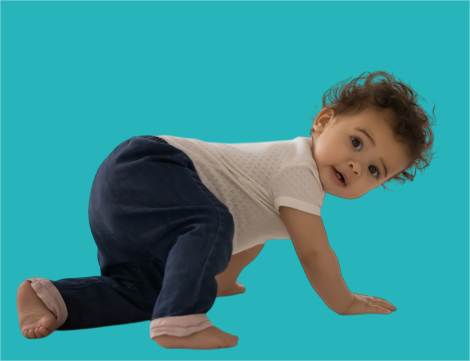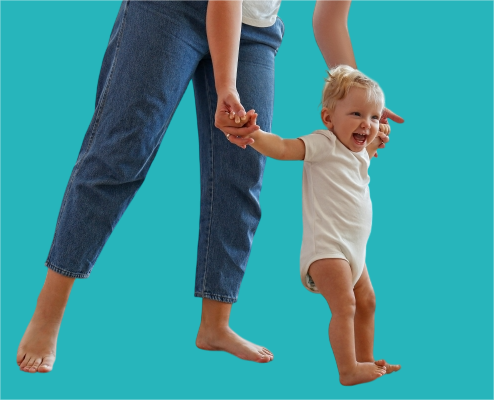Delayed walking is one of the most concerning issues for parents during a child's development, especially during the first two years of life. Parents expect their child to start walking at a certain age, and when it's delayed, they may assume there's a health problem.
Although some cases of delayed walking are normal and are due to individual differences between children, other cases may indicate a developmental, neurological, or muscular problem.
What is delayed walking in children?
It is the inability of a child to begin walking independently after the age of 18 months. Most children begin walking between the ages of 9 and 15 months, and there may be a clear delay if the child reaches the age of two without being able to walk.
Causes of delayed walking in children

There are several reasons that may lead to delayed walking, including:
- Genetic factors: A parent who was late to walk in childhood.
- Muscle weakness or decreased muscle tone.
- Balance or coordination problems.
- Vitamin D or calcium deficiency, which causes rickets.
- Neurological disorders such as cerebral palsy.
- Muscular diseases such as muscular dystrophy.
- Joint or bone problems such as hip dislocation.
- Premature birth may cause a general developmental delay.
Signs of delayed walking
If parents notice some of these signs, it may be necessary to consult a doctor:
- Inability to stand with support after 12 months of age.
- Failure to crawl or crawl after 10 months of age.
- Failure to attempt walking with assistance after 15 months of age.
- Significant stiffness or weakness in the feet or legs.
- Use of only one side of the body.
- Lack of any attempt at movement or exploration.
Methods for Diagnosing Delayed Walking in Children
The doctor relies on several methods to determine the cause of the delay, including:
- Physical examination to assess balance and muscle strength.
- A complete medical history of the child and family.
- Blood tests to detect vitamin deficiencies or metabolic problems.
- X-rays to evaluate bones and joints.
- Referral of the child to a neurologist or physical therapist if necessary.
Possible Complications of Delayed Walking
If there is an organic or neurological cause behind delayed walking, complications may occur, including:
- Delayed general motor development.
- Poor balance or difficulty sitting or standing.
- Behavioral problems due to the fear of not being able to move.
- Impact on the child's psychological and social development.
Treatment Methods Used for Delayed Walking

Treatment depends on the cause and includes:
- Physiotherapy to stimulate muscles and balance.
- Nutritional supplements if there is a vitamin or mineral deficiency.
- Treatment of the underlying cause, such as correcting a hip dislocation or addressing cerebral palsy.
- Occupational therapy to improve fine motor skills.
- Motivational sessions with parents to encourage the child to walk.
Methods for Preventing Delayed Walking in Children
Although some conditions cannot be prevented, the chances of delayed walking can be reduced, such as:
- Monitoring the child's development from birth with a doctor.
- Ensuring the child receives a diet rich in calcium and vitamin D.
- Stimulating the child to crawl, stand, and walk.
- Playing with the child and enabling them to move in a safe environment.
- Reduce the use of walkers, which may hinder normal growth.
- Avoid leaving your child in a car seat or chair for long periods.
Healthy foods to support bone growth and walking
Nutrition plays a major role in a child's motor development. Some of the most beneficial foods are:
- Milk and dairy products to strengthen bones.
- Egg yolks as a source of vitamin D.
- Fish and sardines, which contain omega-3 fatty acids.
- Leafy vegetables such as spinach and broccoli.
- Dates and nuts to strengthen nerves and muscles.
- Natural juices such as oranges to support calcium absorption.
The difference between delayed walking and delayed general development
Delayed walking only indicates a problem with lower motor development, while other skills such as speech, interaction, and play may be normal.
Global developmental delay means that the child is delayed in more than one area, such as language, movement, and social interaction, and may indicate a more serious condition such as autism or mental retardation.
Article Summary
Delayed walking in children can be a source of concern for parents, but often the cause is related to genetic factors.
It is important to monitor your child's growth and visit a doctor if they are delayed in walking after the age of 18 months to ensure there is no organic or neurological cause. Good nutrition and motor stimulation are among the most important factors in prevention and treatment. Physical or medical therapy sessions can help improve the condition if any delay is present.